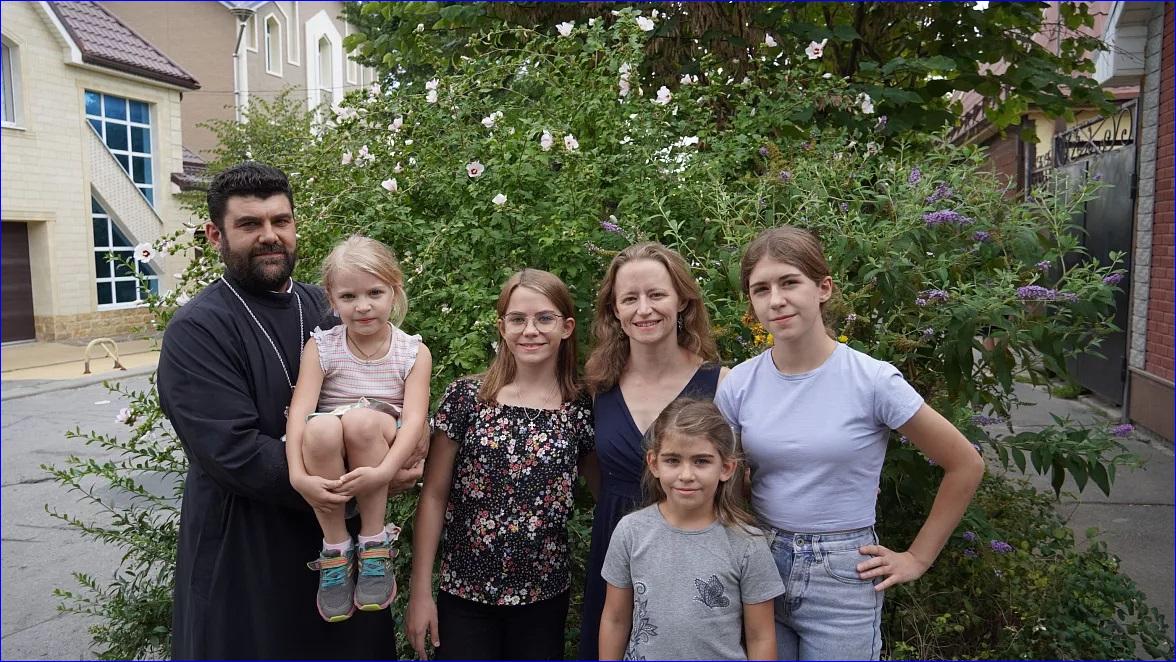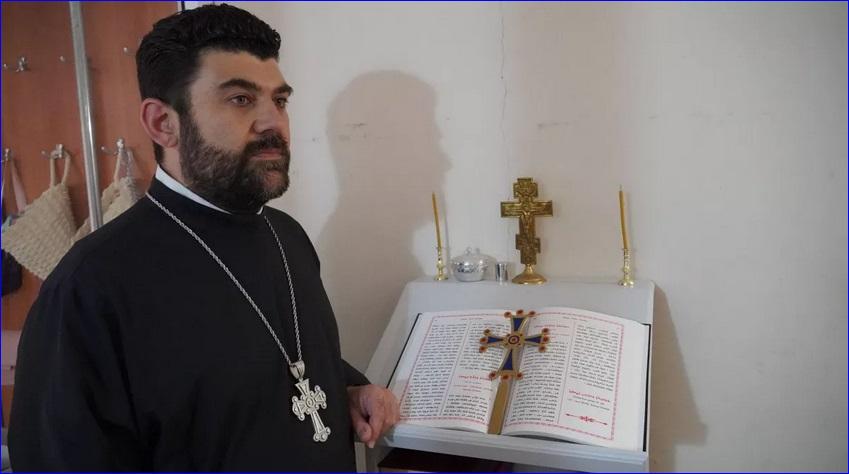


Before moving to Russia, Ephraim Alkhas and his wife Helen "wandered" through google maps around the Russian city of Rostov-on-Don and chose a house on the Internet. In one photo, they noticed an Assyrian flag on the wall... They decided that it was fate and bought this very house.
They moved to Rostov-on-Don a year ago with their four daughters, 17 suitcases and a dog. Now, they all speak fluent Russian, drive a Lada 'Granta' and have another dog.
Why Russia?
In California, Ephraim was a priest in the Assyrian Church of the East. In 2016, he traveled to Russia for the first time, as he was sent to establish communication with the Russian Orthodox Church. Later, he returned several more times, visiting Moscow, St. Petersburg, Rostov-on-Don and Saransk. "I got to know the country, talked to Assyrians living there and saw that life here is good," says Ephraim.
A year ago, the Patriarch of the Assyrian Church sent Ephraim to lead an Orthodox Assyrian parish in Russia. "I was very happy about the move. I already understood Russia and had fallen in love with it," he says. He also loved Rostov-on-Don, "a free, multinational city".
Differences of cultures
Ephraim also had personal reasons for moving. His ancestors were immigrants from Iran with Assyrian roots. His parents were Christians and moved to the United States when the 1979 Islamic Revolution occurred in Iran.
Ephraim was born in California, but spoke Assyrian language at home, preserving the culture. The church was the center of life for him and his family prayed every day. That's why he became a priest.
"My parents chose the U.S., because it seemed like a good Christian country in those days," he explains. But, over the past 30 years, Ephraim has developed many political and cultural grievances with the country.
"There are many nationalities in Russia - Russian, Dagestani, Yakut - and everyone keeps their own culture. In America, there are many of them, too, but there is the idea of a melting pot. This means that cultures should and will be pressed into one common hamburger," he says.
Ephraim, on the other hand, feels that his mission is not only to preserve his culture, but also to pass on the "ancient knowledge" of his ethnic people. His wife, Helen, for example, is a teacher by education and plans to teach Russian children the Assyrian language.
The Moscow-Rostov train & the first days in Russia
The family traveled from Moscow to the southern city of Rostov by train, in the 'platzkart' class. And they were extremely surprised that, for all 16 hours, all 54 passengers aboard behaved extremely cultured and quiet and the WC was always clean.

Russian life did, however, begin with some problems with documents. Ephraim lamented that the Russian language and Russian documents were two huge challenges. Thanks to the help of the local church diocese, he got a temporary residence permit fairly quickly. But, he was surprised that a lot of people take several years to get their documents done (On September 1, 2024, the rules for obtaining a temporary residence permit will change and it will be possible to get it without passing a Russian language exam. Read more here -- Russia Beyond).
"If a Canadian, American or European wants to move [to Russia], he is not coming for a couple of years, but he would embrace Russia as a homeland, buy an apartment or a house here, work, pay taxes. It is incomprehensible why migration cases are so complicated," says Efrem.
Impressions about the Russians
Helen has German roots, but, after marrying Ephraim, she adopted Assyrian culture as her native one. The move to Russia was not accepted by Helen's parents and they no longer talk to their daughter.
"Many Americans have an opinion of Russians as unfriendly and unhappy people. And I thought there would be some negativity from Russians towards us as Americans in return. But, I saw nothing like that! Honestly, I was amazed how open and prejudice-free Russians are," says Helen.
Main advantages of living in Russia
Many Russians are surprised that Americans have come to live in Russia. But, in Ephraim's opinion, they just don't understand the benefits of living there. For his family, the most important advantage has been free kindergartens, medicine and education.
"For ten years in the U.S., my wife did not receive as much treatment as she got [in Russia] in one appointment. She got a big checkup and everything she couldn't cure for years was fixed," the priest says.
In the U.S., their daughters were home-schooled; education there is either very expensive in private institutions or not very good. Besides, it didn't suit them ideologically. In Russia, the girls go to kindergartens and schools for free.
But, there is one thing that the Alkhas family are not yet used to: "I miss the open area in front of the house. There, you can see all the neighbors, say 'Hi!' and 'Bye!' but everyone has high fences [in Russia] and it's uncomfortable for me that I don't know who lives on the street."
Tsarist money & ties to Russia
In Ephraim's house, on the wall next to the pictures of his family, money from Tsarist Russia can be found. They were given to the priest by his father. "The money was found in the pockets of my great-grandfather. He lived in the south of the Russian Empire: in Rostov or in Armavir. His family moved to Russia during the genocide in Iran when his great-grandfather was two years old. He studied there, got married, then lived in Kharkov, participated in the White Movement [during the Civil War in Russia] and, finally, fled back to Iran. I looked for his Russian story, but the documents weren't preserved. Only these tsarist rubles. This money ran away from Russia and, after more than a hundred years, came back," he proudly boasts.
The full version of the interview was published in Russian in the Nation magazine.

or register to post a comment.